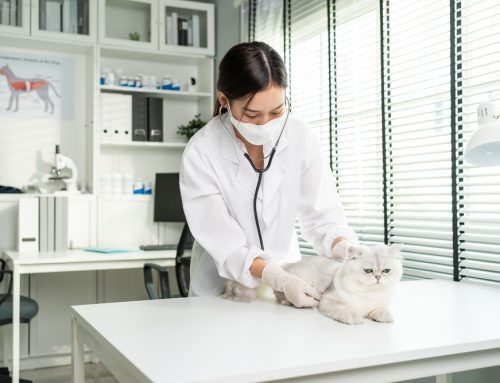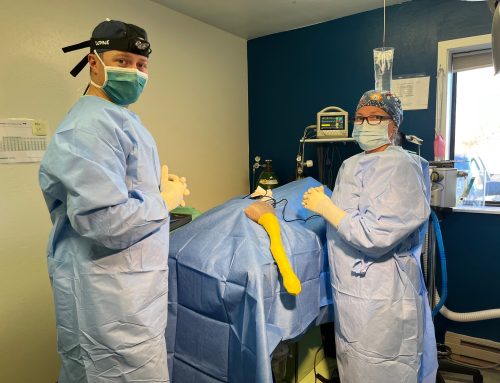When your pet’s normally unassuming pancreas becomes angry, the whole body is at its mercy. This unobtrusive organ is a sensitive fellow prone to dramatic outbursts. Unfortunately, without some knowledge of the pancreas and its somewhat fickle nature, pet owners may overlook the dangerous condition of pancreatitis. Don’t let your pet’s problematic pancreas catch you by surprise. Mountain Legacy Veterinary Center wants you to know about this potentially deadly disease.
Normal pancreatic function in pets
The healthy pancreas is a long, flat, glandular organ that sits under the stomach, along the small intestine. The pancreas has two significant roles:
- Digestive enzyme production — Powerful digestive enzymes are developed in the pancreas, and stored in their inactive state until sent to the small intestine through external ducts (i.e., exocrine pancreas). Once inside the small intestine, the enzymes are activated, and break down proteins, fat, and carbohydrates in food.
- Blood glucose regulation — The pancreas (i.e., endocrine pancreas) also produces the hormones insulin and glucagon, which are crucial to controlling glucose metabolism and use.
Pancreatitis in pets
Pancreatitis literally means pancreatic inflammation, which can occur for several reasons, but may be idiopathic (i.e., have no obvious cause). When inflammation occurs, chemical reactions prematurely activate the enzymes, which digest the fat and protein in the pancreatic tissue (i.e., autodigestion). Dying tissue releases toxic byproducts that cause diffuse inflammation. Severe cases can result in bleeding disorders, kidney failure, heart damage, and multi-organ failure.
Recognizing pancreatitis in pets
Pancreatitis can be sudden and severe (i.e., acute) or mild and fluctuating (i.e., chronic), but in either case, the signs are vague and nonspecific, and may include:
- Frequent vomiting
- Lethargy or weakness
- Inappetence
- Diarrhea
- Increased thirst and urination
- Abdominal distention
- Abdominal pain—your pet may stand with a hunched back, or stretch repeatedly
Chronic pancreatitis may be undetectable, or show only subtle signs, such as weight loss, lethargy, and diarrhea, in pets.
Risk factors for pancreatitis in pets
In 90 percent of cases, pancreatitis has no known cause, making treatment and prevention extremely difficult. Dogs who eat high-fat foods are susceptible to pancreatitis, which is a common diagnosis during the holiday season, when they are overindulged by well-intentioned owners, and tempted by trash cans and counters full of greasy, salty delights. Other risk factors include:
- Obesity — The altered fat metabolism in obese pets increases their risk.
- Breed — Miniature schnauzers are most commonly affected because of their altered fat metabolism, high triglycerides, and a potential genetic predisposition. Other commonly affected breeds include poodles, Yorkshire terriers, dachshunds, and cocker spaniels.
- Health — Pets with inflammatory or hormone-related conditions (e.g., inflammatory bowel disease, diabetes, Cushing’s disease, and hypothyroidism) are high risk.
- Chronic medication — Long-term medication has been shown to increase pancreatitis risk in people, including some classes of chemotherapy, anti-seizure, and antibiotic medications.
Pancreatitis diagnosis in pets
When pancreatitis is suspected, our Mountain Legacy Veterinary Clinic veterinarians will use a holistic approach to diagnose your pet. Because pancreatitis signs are generic, and diagnosis isn’t straightforward, ruling out other conditions first is important. Pancreatitis diagnosis is often a combination of clinical history, physical exam findings, blood work, and ultrasound imaging. Advanced diagnostics allow us to assess your pet’s complete blood count, hydration, and organ function—the nearby liver and kidney are often impacted by free-ranging pancreatic enzymes, and may suffer permanent damage. Ultrasound imaging lets us view the pancreatic structure and detect inflammation severity, as well as other abnormalities, such as tumors or abscesses.
Pancreatitis treatment in pets
Pets with clinical pancreatitis signs are usually hospitalized for treatment, and may need to stay for several days to a week. Your pet will receive intravenous fluid therapy to correct dehydration, pain medication to treat abdominal discomfort, and anti-nausea medication to control vomiting, and will be routinely monitored for changes in their status. Critically ill pets receive serial diagnostics, to monitor their disease progression.
Chronic pancreatitis may be managed at home with supportive medications, subcutaneous fluids, and an ultra low-fat diet for dogs. Cats are maintained on their current diet, as feline pancreatitis has no known nutritional link.
Pancreatitis prognosis in pets
In many cases, pets with pancreatitis recover with prompt treatment, but when therapeutic measures are delayed because of misdiagnosis or lack of awareness, pets can become gravely ill. Prognosis for severe pancreatitis is frequently guarded or poor. If pets do survive, pancreatitis is likely to recur, and may become chronic. With each pancreatitis episode, the already damaged organ becomes more scarred, and eventually will no longer function, resulting in:
- Exocrine pancreatic insufficiency — The reduced enzyme production impairs your dog’s digestion and deprives them of nutrition.
- Diabetes mellitus — Once 80 percent of pancreatic tissue is scarred, the organ cannot adequately produce insulin and glucagon.
Preventing pancreatitis in pets

Because of its unpredictable and idiopathic nature, pancreatitis cannot be truly prevented. However, you can take several steps to reduce your pet’s risk for this painful and debilitating condition, including:
- Maintaining your pet at a healthy weight
- Avoiding feeding fatty treats and table scraps
- Keeping pets confined during holiday festivities
- Feeding a strict low-fat diet to pets prone to gastrointestinal or pancreatic problems
- Staying up to date on preventive veterinary care
Pancreatitis can be merciless and aggressive, but early recognition and disease awareness can make a huge difference in your pet’s recovery and long-term outcome. If you have additional questions about pancreatitis, or are concerned your pet may have the disease, contact the team at Mountain Legacy Veterinary Center.







Leave A Comment